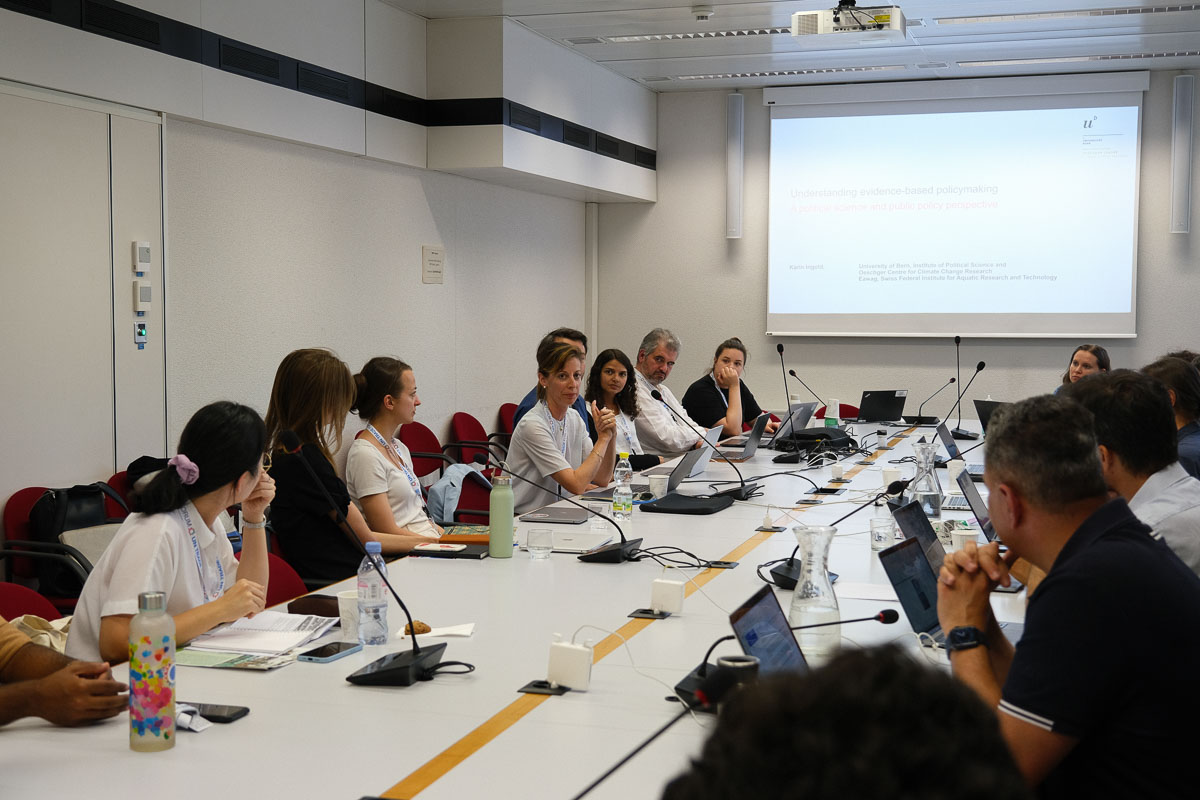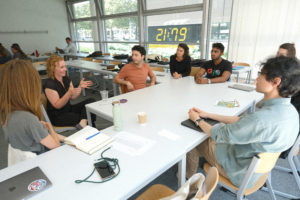Science-Policy Interfaces for environmental solutions: learning to span boundaries

Our first week-long summer school hosted 15 participants with diverse backgrounds, ranging from PhD candidates and early career researchers to young professionals from International Organisations and boundary organisations, willing to learn, share and leverage their experiences to tackle global environmental issues. The programme featured highly experienced speakers and mentors – environmental experts working in science, policymaking or at the boundary between the two worlds.
The programme started with a deep dive into the theoretical and practical knowledge about science-policy interfaces and how they can be leveraged to tackle environmental issues. Participants also received a comprehensive overview of the key trends in environmental governance. This provided a compass to effectively navigate all the learning that would be acquired during the week.


The summer course provided spaces for dialogue between participants and experienced practitioners that have engaged in science-policy interaction in high-level national and international fora. This exposed participants to a wealth of insiders’ knowledge which is difficult to access and spurred vivid exchanges.


World Meteorological Organization's Secretary General Emeritus Michel Jarraud engaged the course participants in an open discussion sharing the challenges that climate science has been facing, such as misinformation and scepticism. José Romero, Former Chief Scientist at the Swiss Federal Office for the Environment and Agustin Harte, Programme Manager – Scientific and Technical Assistance Division at the Secretariat of the Basel, Rotterdam and Stockholm Conventions, shared their approaches on mobilising science and evidence in global policy-making processes.On the second day, the group of participants visited the International Environment House, which gathers a vast number of organisations working in the environmental field, from the UN Environment Programme (UNEP) to many secretariats of multilateral environmental agreements and NGOs. We were hosted by the Geneva Environment Network.

Participants were exposed to a fascinating session on how UN organisations attempt – and sometimes fail – to effectively leverage scientific data through digital innovations. They also learned about the political barriers to research uptake in a variety of policy settings and concrete strategies to overcome them.


Matteo Tarantino, assistant professor at the Catholic University of Milan unpacked the concept of data ecologies as an essential element of evidence-based policymaking.

Karin Ingold from the University of Bern illustrated – with her empirical research on farming practices in Switzerland – the challenges related to evidence mobilisation by policymakers and potential pathways to overcome these barriers.
The summer school offered an opportunity to organise a public roundtable featuring senior experts involved in IPCC, IPBES and the upcoming global science-policy panel on chemicals, waste and pollution prevention. Guest speakers – Diana Urge-Vorsatz, Silke Beck and Martin Scheringer – reviewed the role and functions of intergovernmental science-policy panels and discussed the strengths and limits of these models as effective mechanisms to help tackle climate, biodiversity and chemical pollution issues.

The third day of the programme was dedicated to developing skills in strategic thinking, planning and implementation. Participants worked with practical tools – from stakeholder mapping in international negotiations to identifying the root causes of a policy problem and shaping science-policy initiatives through a theory of change.


Participants collaborated around case studies under the mentorship of Jennifer Allan from University of Cardiff and IISD and Melanie Paschke from the Zurich-Basel Plant Science Center.Understanding the United Nations complex ecosystem is crucial to strategically engaging with international policymakers. Some activities of the programme were about understanding this specific ecosystem within international Geneva.

To conclude the programme, the last day was about exploring career paths by discussing competencies and hearing from two boundary spanners and their journey in the field: Zhanyun Wang, a scientist from EMPA who made his way through to policy organisations in the field chemicals and waste governance and Charlotte Pavageau from Biovision, who practises on a daily basis the art of acting as an honest knowledge broker in the field of agroecology. Julian Keimer, policy analyst at the European Commission's Joint Research Centre, guided the participants through the Science4Policy competence framework. It was also the time for participants to reflect on ways to further develop their skills and resources to pursue their journey at the science-policy interface.

Julian Keimer presenting the EC's Joint Research Centre and the Science4Policy competence framework.

Exchange of experience with Zhanyun Wang and Charlotte Pavageau.

After the concluding remarks from the organisers, a round of discussions and feedback from the participants.

Participants were enthusiastic about their experience. “Through this programme, you managed to make visible what is usually invisible”, said one of them. They have laid the foundation of a rich group of peers and the GSPI will endeavour to keep this community growing with future editions of this programme.




